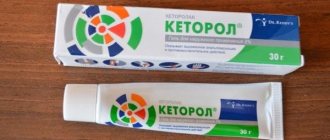Most people use Duphalac to cleanse the intestines, as it is one of the most effective medications in the laxative group. This medication has a significant advantage - it is acceptable for use in childhood, which makes this medicine more in demand and popular. It is recommended to take Duphalac as prescribed by a specialized specialist; such precaution will protect the patient from possible side effects.
- 2.1 Regimen and dosage
Manufacturing form and components
The main component of the pharmaceutical product is lactulose. When effective, it is not absorbed into the walls of the stomach and intestinal tract. The lack of interaction with the mucous membrane is one of the advantages of a delicate laxative. Thanks to this, the medication is indicated for use even in infants. The only additional ingredients are pure water.
In the pharmacy chain, the drug is sold over the counter in the form of syrup in plastic bottles of 0.2, 0.5 and 1 liter with a screw cap. The medication is packaged in a cardboard box and equipped with a measuring cup.
The pharmaceutical product is also offered packaged in 15 ml plastic bags coated with aluminum - 10 pieces per box.
The purchased medication is stored so that it is out of the reach of children. The place should be dry and cool - no more than 25 degrees Celsius. The drug is approved for use for three years from the date of production. If the shelf life has expired, giving the medicine to children is strictly prohibited.
The cost of Duphalac depends on the volume of the bottle or the number of packets in the package. The price of a laxative can vary from 290 to 750 rubles.
Laxative "Duphalac" for adults: contraindications for use
- hypersensitivity to the components of the drug;
- galactosemia;
- intestinal obstruction.
The medicine should not be used for rectal bleeding, colostomies and ileostomies. It is prohibited for patients with signs of appendicitis. If the patient has had intestinal bleeding at least once, then the drug is contraindicated for him.
Appendicitis
Laxatives should not be used by patients who are intolerant to lactose or lactulose. Duphalac is not recommended for patients with impaired absorption of monosaccharides in the gastrointestinal tract.
In order to avoid flatulence, patients with Roemheld syndrome should take the drug very carefully. It is correct to start with small doses and gradually increase them. Patients with diabetes mellitus with long-term use of Duphalac should have their blood tested. The medication is taken under the supervision of a physician, since increasing the dosage leads to absorption of the drug and glycemia worsens.
Contraindications for taking the medicine are also abdominal pain, nausea and vomiting of unknown origin. Parallel use with antibiotics reduces the healing properties of Duphalac.
The medicine is stored at a temperature not exceeding 25 °C in a dark place inaccessible to children. The shelf life of the drug is 3 years from the date of manufacture.
When is a drug such as Duphalac prescribed? Reviews from adults indicate that this drug effectively helps in the presence of the following abnormalities:
- for constipation (to regulate the physiological rhythm of colon emptying);
- to soften stool for medical purposes (for example, for hemorrhoids, after anal or colon surgery);
- for hepatic encephalopathy in adults (for the prevention and treatment of precoma or hepatic coma).
The drug "Duphalac", reviews of which are left by many patients, is indicated when the following pathological conditions occur, such as:
- chronic constipation;
- hemorrhoids, paraproctitis (to facilitate defecation);
- preparation for surgery and postoperative period;
- hepatic encephalopathy;
- coma and precoma caused by liver failure (with liver cirrhosis of various etiologies, chronic viral hepatitis, etc.);
- dysbacteriosis;
- enteritis (caused by salmonella);
- acute poisoning of children and adults.
This laxative should not be taken under the following conditions:
- galactose (or fructose) intolerance;
- hypersensitivity of the patient to any of the components of the drug;
- acute intestinal obstruction;
- galactosemia.
Therapeutic effect
The pharmaceutical product is intended to stimulate intestinal peristalsis, improve the absorption of calcium salts and phosphates. The medication also affects nitrogen metabolism - ammonia compounds are transferred from the circulatory system to the intestinal tract, where the formation of toxins is significantly reduced and they do not enter back into the blood.
The therapeutic effect is based on the interaction of the biologically active component with the natural microflora of the intestinal tract, which contributes to the growth of the number of lactobacilli.
Their activity leads to a decrease in osmotic pressure and an increase in intestinal contents, which reduces constipation and makes the stool softer.
Absorption of lactulose in the gastrointestinal tract is low. After ingestion, the drug is sent almost unchanged to the large intestine, where it is broken down by the microorganisms contained there. They are capable of processing up to 70 ml of the drug per dose. If the dosage is higher, lactulose will be excreted unchanged.
Side effects
By softening feces, Duphalac attracts a certain amount of fluid from the intestinal lumen. Exceeding the duration of treatment will lead to the development of water-salt imbalance. The body experiences a deficiency of microelements necessary for the active functioning of all vital systems.
Recommendation: “If long-term treatment of chronic constipation is expected, doctors, simultaneously with Duphalac, recommend that patients take rehydration drugs, for example, Regidron or Gidrovit.”
There have been cases of the following side effects of Duphalac:
- nausea;
- attacks of vomiting;
- diarrhea;
- bloating, rumbling and seething.
During the first days of taking laxatives, excess gas may occur. As a rule, this and other symptoms of flatulence disappear without any negative consequences for the body.
Indications for use
Syrup is used for constipation in children of various etiologies and to regulate the natural emptying of the intestinal tract in many pathological conditions:
- Insufficient production of certain digestive enzymes;
- Putrefactive dyspepsia syndrome in children under one year of age;
- Deterioration of intestinal motility due to decreased motor activity;
- Chronic enteritis or dysbacteriosis, when pathological microflora grows in the gastrointestinal tract;
- Liver diseases and toxic encephalopathy - the medication reduces the toxicity of protein metabolism products in the intestine.
Syrup is recommended for children with salmonellosis and other intestinal infections, as well as acute food poisoning.
The drug is also used before some diagnostic tests of the colon, when it is necessary to relax the intestines and clear them before surgery.
Composition and effect of syrup on the body
The main component of Duphalac is lactulose, which is of synthetic origin and has the following qualities:
- does not change its properties under the influence of gastric juice,
- has a low percentage of absorption,
- cannot be split,
- is active in the rectum.
As a result of the ability of lactulose to activate intestinal motility, the consistency of stool is normalized and the normal process of defecation is restored.
With this cleansing of the intestines with Duphalac, the absorption of calcium and phosphoric acid salts improves. The syrup promotes the release of ammonia from the blood, thereby reducing the formation of breakdown products.
The existing reviews of Duphalac about intestinal cleansing are the best proof of its effect on the body. People write that they lost weight. But the lost kilograms are not associated with fat burning - a person loses weight under the influence of syrup because feces with food debris that accumulate on the intestinal walls and represent fecal stones are removed from the body. Lactulose promotes their softening and rapid removal. Over many years, so many of them accumulate that after ridding the body of them, a person loses several kilograms.
When fighting excess weight, the process of cleansing from putrefactive bacteria and accumulated feces is important - Duphalac for weight loss is used for this purpose. If you do this correctly, the metabolism is normalized, the body loses excess fluid, this prevents the development of edema, and the person loses weight.
Contraindications, side effects and overdose
Using the drug in excessive amounts can lead to a pathological condition characterized by symptoms such as abdominal pain, diarrhea, and electrolyte imbalance. If such consequences occur, the dosage should be reduced after consultation with a pediatrician or completely stop using the medication.
The drug should not be taken if:
- Hypersensitivity to lactulose;
- Obstruction or perforation of the intestinal walls;
- Galactosemia;
- Fructose and lactose intolerance;
- Lactase deficiency;
- Glucose-galactose malabsorption.
If a child has impaired glucose tolerance, the drug is prescribed with caution.
In general, the laxative medication is well tolerated by both children and adults. Sometimes the reaction to taking it is bloating of the peritoneum, flatulence, nausea and vomiting, and intestinal spasms. Such phenomena occur in the first days of using the medication. Long-term use may decrease the concentration of certain mineral salts in the blood. Long-term therapy involves blood tests to monitor the amount of electrolytes in the plasma.
The benefits and harms of laxatives
Duphalac for weight loss is better suited than other, harsher laxatives. Its advantage is that it exhibits a slight osmotic effect when cleansing the intestines.
Another positive property of Duphalac syrup is that the caloric content of the product is low, so its use does not cause weight gain.
The ability of this laxative to improve the absorption of salts prevents the development of brittle bones - osteoporosis. Duphalac is not addictive and is not absorbed into the cells of the body's tissues.
In the instructions for use of Duphalac, the benefits and harms are described in detail; they need to be known, because exceeding the terms of use and dosage can lead to severe vomiting and diarrhea, as well as metabolic disorders (convulsions, heart pain, dehydration).
Instructions for use for children
Duphalac is usually prescribed by a doctor in a daily dosage. The medicine can be given to the baby at once or divided into two doses. The last option is suitable for children under 2 years old. After observing how the baby reacts to the medicine, the pediatrician will adjust the initial dosage.
Duphalac - instructions for children:
| Age limits | Daily dose | |
| Initial treatment | Maintenance therapy | |
| For children under 1 year | 5 ml | 5 ml |
| For children from 1 year to 6 years | 5–10 ml | 5–10 ml |
| For children from 7 to 14 years old | 15 ml | 10–15 ml |
| For teenagers under 18 years old | 15–45 ml | 15–30 ml |
The dosage for children is adjusted based on how the baby feels after taking the medication. Medicine for newborns is dissolved in breast milk or formula, and occasionally in water. The use of the medication allows you to solve problems with constipation gently, within a few hours. In accordance with the instructions for use, newborn children are given the medicine in the morning when the baby wakes up or immediately after breakfast. If the baby burps immediately, a repeat dose is offered.
The criteria for correctly selected syrup dosage are:
- Soft stools twice or thrice a day;
- No pain in the abdomen or other unpleasant symptoms;
- The acidity of the colon contents is in the range of 5.0–5.5.
For liver pathologies, the therapeutic effect becomes noticeable after 2–5 days, depending on the individual metabolic rate.
If the condition does not improve within a few days and the stool does not soften, the dose will need to be adjusted or the laxative replaced, but only after consulting a doctor. The same actions will be needed if constipation occurs again after a short period of time.
Use for colon cleansing
The described laxative is often used when it is necessary to cleanse the colon. The features of the procedure are as follows:
- First, you should mix 200 ml of the medicine with a glass of boiled, strained water and drink the resulting liquid for 7 hours at intervals of 15 minutes. Drink the solution slowly and in small sips.
- It is worth considering that you need to drink a laxative 2 hours after a meal and preferably after lunch, around 16:00, so that the last dose of the medicine is closer to 00:00 at night and does not last until the morning. Before the procedure, you should only eat easily digestible food.
- Emptying begins approximately 60 minutes after the first dose is taken and ends 2 hours after the last dose of medication.
- During the process of emptying there should not be severe pain or cramping; there may be discomfort and heaviness in the lower abdomen, but this is a normal reaction that will pass after the action of the laxative. When performing intestinal cleansing with Duphalac, it is strictly contraindicated to relieve pain and spasms with painkillers.
Regimen and dosage
The drug as a laxative is suitable for both adults and small children, but in different dosages.
Constipation is considered a fairly common occurrence in the body, and it is sometimes difficult to cope with. The laxative Duphalac comes to the rescue, which is approved for use by both adults and small children, but in the appropriate dosage. For patients under 3 years of age, the dosage should not exceed 5 ml, and for children aged 3-6 years it is recommended to take 5-10 ml. School-age children under 14 years old can drink 10-15 ml of laxative. For adults, the dosage is 15-45 ml and as maintenance therapy it is recommended to take 10-25 ml of the drug, and on the 3rd day the dosage is gradually reduced. Take the medicine 1 r. per day, preferably in the morning at breakfast.
If necessary, the dosage can be increased, for example, if after 2 days of taking the medication the patient’s condition has not improved. For patients with renal coma, the recommended dose of Duphalac is 30-45 ml three times a day. If the disease is severe, the patient may be given cleansing enemas with this laxative. To do this, pour 200 ml of syrup into 700 ml of water and carry out the procedure.
Appointment before colonoscopy
Duphalac is used to prepare the body for colonoscopy. 3 days before the diagnostic examination, the patient is recommended to exclude from the diet foods that contain a lot of fiber (berries, fruits, mushrooms, legumes, vegetables, varnish). The menu may include chicken, fish, broths, white bread and butter. When there is 1 day left before the diagnostic procedure, the patient should start taking a laxative. 2 hours before the first dose of Duphalac, you need to drink tea or broth, then take a solution of 200 ml of the medicine diluted in 2 liters of purified water. You need to drink this solution for 3 hours, washing it down with juice if desired. The effect of the laxative should be noticed after 2 hours, the stool takes on a liquid consistency. The intestines should finally empty their bowels 3 hours after taking the last dose of the medication.
Rules for taking medication
The laxative is administered orally. The medicine is taken orally as diluted with water, milk, dairy
mixture and in pure form. The drug for children up to 2–3 months is given using a syringe without a needle. The toddler must swallow the syrup without holding it in his mouth. For older babies, you can use a spoon.
If the medication is packaged in a bag, then after opening it, pour the contents into the mouth and immediately swallow.
But this method of use is allowed for children 3–4 years old and older. Children under 3 years of age cannot yet effectively control their swallowing reflex and are capable of choking.
The duration of use of Duphalac is determined by the doctor for each child individually. Due to the fact that the pharmaceutical does not accumulate in the human body, it can be given for as long as needed to normalize the functioning of the gastrointestinal tract. If the drug is used as a prebiotic, the minimum course duration is 30 days.
Colon cleansing technology with Duphalac
It is better to clean your clogged intestines with Duphalac on a day off; you need constant access to the bathroom.
- Buy a bottle of Duphalac (200 ml).
- A day or two before cleansing, give up solid food. Eat cereals, liquid broths, drink as much still water as possible.
- On the day of cleansing, it is better to refrain from eating. If this cannot be done, then the diet should be gentle. To prevent dehydration, ensure drinking regime: drink still water, herbal decoctions, berry jelly without limitation. Store-bought juices and carbonated drinks will not do any good.
- The event is best held by 12 noon.
- Divide the contents of the bottle in half. Dilute 100 ml of the medicine with 1.5 liters of chilled boiled water. Drink the liquid within 4 hours in random doses.
- Wait 1-3 hours, bowel movements should begin.
- By 18:00, dilute the remaining portion of the medicine with water in the same dosage;
- Drink the solution before 20.00.
- Wait for a bowel movement again. When a clear liquid without impurities begins to emerge, the cleansing procedure is considered complete.
- During cleansing, do not take antispasmodic or painkillers.
- After the procedure, provide your body with rest.
If the general condition worsens, painful diarrhea, or the presence of bloody stool, the activity should be discontinued. Cleansing should be painless and cause slight discomfort.
Reviews about the pharmaceutical product
Most of the feedback about the effects of mild laxatives is positive. Duphalac is not addictive: thanks to this, the drug is popular among mothers whose babies suffer from frequent constipation.
If you follow the instructions for use, side effects are quite rare. Mothers write that in the first days it is not necessary to give the full dosage prescribed for the day, especially to babies with sensitive intestines. Otherwise, manifestations of colic, increased bloating, and gas formation are possible.
Duphalac, according to reviews, is especially effective for constipation in artificially-trained children.
They need a laxative, which is approved for long-term use until the stomach and intestines become stronger. "Duphalac" is one of the pharmaceuticals that has an effective, gentle effect that does not irritate the delicate walls of the mucous membrane.
Additional recommendations
The Internet is full of conflicting information and reviews of various directions about the drug. Some parents believe that only Duphalac helped eliminate constipation in the baby, while others are sure that they would never have given it to their little one if they knew how many negative aspects would arise after use. Negative reviews can be explained by dosage violations and instability of the course of treatment.
Addiction and the presence of an effect only during administration were also noted. Allergic reactions, abdominal pain in children and accumulation of gases are common. Therefore, simultaneously with the drug, it is advisable to use an anti-colic remedy for newborns.
Even the most effective medications should not be given to infants without consulting a pediatrician. After all, constipation in infants is often a temporary ailment that will go away on its own if the baby’s intestinal function is not disrupted by adult intervention.
We bring to your attention a video in which a pediatrician will talk about how to deal with constipation in a baby.
Prohibition on taking the drug
Contraindications to the drug Duphalac are divided into 2 groups:
Absolute
This group includes conditions in which taking Duphalac is prohibited:
- individual intolerance to Lactulose (the main active ingredient);
- intestinal obstruction caused by tumors or prolonged constipation;
- intestinal perforation;
- hereditary disorder of lactose breakdown (galactosemia);
- intestinal perforation or peptic ulcer of the digestive tract;
- condition after installation of a colostomy.
With these deviations, you cannot take Duphalac. If these contraindications are present, the use of the medication can cause serious complications.
Relative
These include contraindications for which, under the supervision of a doctor, you can take Duphalac:
- Diabetes. The contraindication is based on the fact that Lactulose contains sugar and can cause hyperglycemia in a diabetic. Correcting the diet and changing the dose of glucose-lowering drugs make it possible to treat diabetes. According to endocrinologists, for most diabetics, minor dietary adjustments are sufficient to maintain blood glucose levels;
- Long-standing colostomy. If recently performed stomoplasty is considered an absolute contraindication, then with a long-established colostomy, to facilitate bowel function, it is permissible to take Duphalac under the supervision of a doctor.
Pregnancy is not a contraindication for the use of the medication. Most expectant mothers successfully eliminate a delicate intestinal problem with therapeutic doses of the drug. But it is recommended for ladies in an interesting position to take Duphalac under the supervision of a doctor.
Before drinking a laxative, it is recommended to read not only the indications for use, but also carefully study the contraindications and side effects of Duphalac. Such information will help you not to take the drug if there are absolute contraindications and to promptly identify a possible side effect.
Sources:
Vidal : https://www.vidal.ru/drugs/duphalac__30517 GRLS : https://grls.rosminzdrav.ru/Grls_View_v2.aspx?routingGu >
Found a mistake? Select it and press Ctrl + Enter
Duphalac is a drug with a laxative pharmacological effect. It is used to loosen stools for constipation of various origins and in the complex treatment of pathologies of the digestive system.
Composition of the drug
- When taking this drug, there is no irritation of the mucous membrane.
- Duphalac solution does not affect the smooth muscles of the intestines.
- When taking this laxative, a deficiency state (anemia and hypovitaminosis) does not develop, since it does not affect the absorption of vitamins.
- Suppresses the growth of pathogenic bacteria (in particular, salmonella).
- After taking Duphalac (reviews clearly indicate this fact), the maximum effect appears on the second day. This feature is due to the duration of passage of the drug through the gastrointestinal tract (at least 24 hours).
- It is practically not absorbed (up to 97% of the substance leaves the intestinal tract unchanged).
- Lactulose does not occur in nature - this substance is obtained as a result of thermal effects on cheese whey. It is also isolated from cow's milk during the cheese making process. The composition of lactulose is very similar to the rennet obtained from breast milk. Therefore, the drug "Duphalac" can be used in children from the first days of life without risk to health.
Duphalac











